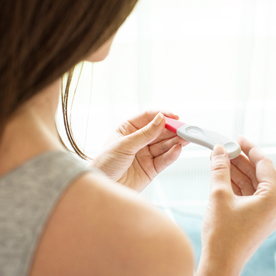
PCOS is a complex – often misunderstood – hormonal condition affecting many women in the UK. PCOS is driven by insulin resistance and higher-than-normal androgen production, which can result in a number of challenging symptoms, like weight gain, excessive hair growth (hirsutism), and acne.
The hormonal imbalances that earmark PCOS can also cause irregular periods, fertility issues, and pregnancy complications, which can be some of the most challenging aspects of the disorder.
Despite the complex relationship between PCOS and pregnancy, we want to reassure there are still plenty of ways to support your health and happiness at every stage of the reproductive journey.
PCOS and fertility
Around one in seven couples may have difficulty getting pregnant, the equivalent of about 3.5 million people in the UK (1). For women with PCOS, however, falling pregnant can be a little more complicated.
The hormonal imbalances that characterise PCOS often lead to menstrual irregularities, which can affect ovulation. And if you aren’t ovulating regularly, you may struggle to fall pregnant.
High levels of androgens and insulin – both symptomatic of PCOS – can also interfere with ovulation, making it more difficult to conceive.
 Your weight can affect fertility, too: being overweight or severely underweight can disrupt ovulation (2). And w omen with PCOS are commonly affected by weight gain. Thankfully, losing even a small amount of weight can maximise your chances of getting pregnant.
Your weight can affect fertility, too: being overweight or severely underweight can disrupt ovulation (2). And w omen with PCOS are commonly affected by weight gain. Thankfully, losing even a small amount of weight can maximise your chances of getting pregnant.
Many women only discover they have PCOS when they struggle to fall pregnant, especially if they were on hormonal contraception, which masks irregular periods.
Uncovering fertility issues can be challenging. Naturally, many women experience feelings of anxiety, depression, and low self-esteem when processing this aspect of PCOS.
If you’re finding things hard, rest assured, you’re not alone. Help and support are always available. Consulting your GP or therapist is the best place to start.
Lifestyle interventions to help PCOS fertility
You have more control over your fertility than you think. There are plenty of simple tweaks you can make to your lifestyle to improve your chances of getting pregnant with PCOS.
Manage your weight
Women with PCOS often experience higher-than-normal androgens (‘male’ hormones) and insulin resistance, which can result in weight gain (3).
Research suggests losing weight may help balance hormones, restore monthly ovulation, and increase the likelihood of a healthy pregnancy (4).
Although PCOS can make weight loss harder, working towards a healthier weight is still well within your reach. You can read more about the best approach to losing weight with PCOS here.
Stay active
Studies have found that moderate-intensity exercise may improve ovulation and reduce insulin resistance, making pregnancy more likely (5). Try to find movement you enjoy that will help you to stay motivated. Just be careful not to exercise too frequently or intensely. High-intensity exercise, like spin or aerobics, can lead to a surge in stress hormones, like cortisol. Stress hormones are secreted by the adrenal glands, which are responsible for the production of 20-30 per cent of androgenic hormones.
Excessive stress from exercise may send the adrenal glands into overdrive and cause the overproduction of androgen hormones. Androgens, like testosterone, are behind many PCOS symptoms, such as hair growth, acne, and ovulation issues, so try to move moderately most days of the week.
Eat a balanced diet
Fuelling your body with the right food is one of the most important considerations if you have PCOS and are trying for a baby.
Eating a minimally processed, whole food, plant-focused diet will support weight management and, crucially, reduce insulin resistance, which often drives PCOS.
You can read more about the dietary changes to support conception with PCOS here.
Add specific supplements
In addition to eating a healthy, balanced, and diverse diet, experts often recommend fish oil – or a vegan alternative – B complex, and myo-inositol to support female fertility, so you may wish to add these supplements to your arsenal.
Look after your mind
Unfortunately, PCOS and mental health challenges go hand in hand. The distressing nature of the condition can lead to anxiety, depression, and low self-esteem. And the pressures of trying for a family can often amplify this emotional burden.
Frustratingly, increased stress can increase the severity of PCOS symptoms, creating a negative feedback loop. Chronic stress may contribute to insulin resistance, which already affects many women with PCOS and is known to drive symptoms (6).
Scheduling self-care every day can help buffer against stress. There’s no single way to decompress and unwind. Just find what works for you. Spend more time on hobbies or activities you enjoy. Get outside. Practice mind-body exercises, like yoga or deep breathing. Take a relaxing Epsom salt bath at the end of the day.
Try acupuncture
Derived from ancient Chinese medicine – and now endorsed by the NHS – acupuncture is the practice of inserting fine needles at certain sites in the body for therapeutic purposes.
Emerging research suggests acupuncture may support hormone regulation, promote ovulation, and reduce insulin resistance in women with PCOS, making it a promising tool for women with PCOS looking to support their fertility (7).
Medical interventions to aid PCOS fertility
In addition to lifestyle changes, you may wish to consult your GP about medication that might help.
Clomifene
Encouraging the monthly release of an egg from the ovaries, clomifene is the first line of defence for women with PCOS trying to get pregnant.
Metformin
If you’ve tried clomifene without success, you may be recommended metformin. Metformin is typically prescribed to people with type-2 diabetes, but it can also lower blood sugar levels and insulin in women with PCOS.
Metformin can support regular monthly periods, stimulate ovulation, and lower the risk of miscarriage, as well as reduce some of the long-term health risks associated with PCOS, including heart disease and high cholesterol.
Letrozole
Letrozole is sometimes offered to stimulate ovulation instead of clomifene.
Gonadotrophins
If you struggle to conceive despite taking oral medicines, your GP may recommend a different type of medicine called gonadotrophins, administered by injection.
However, there's an increased risk this medication may overstimulate the ovaries and lead to multiple pregnancies.
IVF treatment
If you have PCOS and fertility medications haven’t helped, you may be offered in vitro fertilisation (IVF) treatment.
IVF collects the eggs from the ovaries and fertilises them outside the womb. Once fertilised, the egg or eggs are placed back into the womb.
Surgery
Though it sounds alarming, laparoscopic ovarian drilling is a simple surgical procedure that makes several small holes in each ovary, often with a laser.
This surgical procedure may lower testosterone and luteinising hormone (LH) and increase follicle-stimulating hormone (FSH), to help balance hormones and the normal function of your ovaries.
Freeze your eggs
If you have PCOS and aren’t ready for children, you may want to consider freezing your eggs. While this can be expensive, it offers freedom from the biological clock.
Getting pregnant with PCOS after 30
Many women believe their biological clock ‘runs out’ once they reach 30, but this isn’t always true. Although women are born with a finite number of eggs that diminish with age – especially after 35 and even more substantially after 37 – every woman has a unique fertility timeline (8).
However, contending with the natural ageing process on top of PCOS can be a further obstacle when trying to conceive after 30. As such, it’s all the more important to tweak and fine-tune your lifestyle to support your body for pregnancy.
If you’re between 30 and 35 and haven’t successfully fallen pregnant after a year of well-timed intercourse without birth control, you may want to seek help from a fertility specialist. And if you’re over 35, we recommend seeking medical help if you’ve been trying for six months without any luck.
PCOS and pregnancy
Navigating PCOS during pregnancy can make things are little more complex. It may increase the risk of preeclampsia, gestational diabetes, and, in some cases, miscarriage.
Although this may sound alarming, equipping yourself with as much information as possible will help you understand how to maximise your chances of having a healthy pregnancy.
PCOS and miscarriage
Miscarriage is the loss of a pregnancy during the first 23 weeks. It’s estimated one in six pregnancies in women who know they’re pregnant will end in miscarriage, with many more occurring before a woman discovers she’s pregnant (9).
Research suggests there may be a link between PCOS and miscarriage. Women with PCOS are 30-50 per cent more likely to experience a miscarriage than 10-15 per cent of women without the condition (10). While the exact reason remains unclear, the hormonal imbalances in PCOS may play a role.
PCOS may also put women at a greater risk of miscarriage because the condition is often linked to weight gain, making spontaneous pregnancy loss more likely (11).
What can you do?
Unfortunately, there’s often nothing you can do to prevent a miscarriage. Some experts think it may be due to chromosomal abnormalities in a baby, but there could be many other explanations (12).
Still, living in a healthy, balanced way could lower your risk. Avoid smoking, limit alcohol, and eat a diverse, wholefood, plant-focused diet to reduce the possibility of miscarriage. Maintaining a healthy weight before falling pregnant can also increase your chances of having a full-term pregnancy.
Read about healthy, manageable PCOS weight loss here.
What if this happens to you?
Having a miscarriage can be distressing for both you and your partner. You may find yourself overwhelmed with grief, sadness and desolation, which is completely normal.
Getting support is always a valid and important option. Turning to your GP is a great place to start. Alternatively, you may wish to contact The Miscarriage Association or Cruse Bereavement Care.
Pre-eclampsia
Aside from increasing blood pressure, pre-eclampsia causes the excretion of protein in your urine during pregnancy. It typically occurs during the second half of pregnancy or soon after your baby is delivered.
Mild pre-eclampsia affects up to six per cent of pregnancies, with severe cases developing in about one to two per cent (13). PCOS may put women at a slightly higher risk of pre-eclampsia.
Pre-eclampsia symptoms include headaches, vision problems, pain below the ribs, vomiting and swelling. If left untreated, severe cases can lead to complications such as fits, strokes, organ problems and can put a baby at risk of underdevelopment.
What can you do?
As it stands, there’s no certain way to prevent pre-eclampsia. However, following a healthy lifestyle could lower your risk. Reducing your salt intake, avoiding fried foods, exercising regularly, and limiting alcohol may help.
Weight management is also important. If you’re overweight or obese, try to reach a healthy weight before falling pregnant.
What if it happens to you?
If you’ve been diagnosed with mild pre-eclampsia, your healthcare professional will check your blood pressure and urine regularly until your baby is born.
If you have severe pre-eclampsia, on the other hand, you might need to stay in the hospital until you have your baby, so that both you and your baby can be closely monitored.
Gestational diabetes
Gestational diabetes is a condition that causes blood sugar levels to become too high in pregnancy. Left untreated, it may lead to caesarean delivery, preterm birth, and high birth weight.
PCOS is thought to create the perfect storm for gestational diabetes. Insulin levels significantly increase in the second and third trimesters of pregnancy. And since the majority of women with PCOS already present with insulin resistance – a risk factor for type-2 diabetes in itself – it can make gestational diabetes more likely (14).
What can you do?
Eating a healthy diet is a simple, effective way to balance blood sugar levels during pregnancy. Where possible, try building your meals around foods with a low glycaemic index (GI) – foods that raise your blood glucose levels relatively slowly after eating, such as sweet potato, quinoa, or wholegrain bread.
Staying physically active can have a positive effect on your blood sugar levels, too. Aim for at least 150 minutes of moderate-intensity exercise a week. Moderate intensity means you should feel warm and slightly breathless on exertion.
You can also read more about balancing your blood sugar levels in PCOS here.
What if it happens to you?
Your GP may take extra care when assessing your blood sugar levels if you have PCOS. And if your blood sugar levels can’t be managed by improving your diet and lifestyle alone, you may be given medication.
Reassuringly, most women with PCOS who develop gestational diabetes have healthy babies granted the condition is managed successfully during their pregnancies.
Find out more
Navigating PCOS and pregnancy can be difficult, but you don’t need to do it alone. There’s plenty of support available, so always ask for help if you need it. Remember, if you aren’t ready to have a family, always use contraception.
If you found this exploration into PCOS and pregnancy useful, you can find similar guidance on our dedicated PCOS health hub. Alternatively, please get in touch with our team of expert Nutrition Advisors, who are on hand to provide free, confidential advice
References:
-
NHS choices. Available online: https://www.nhs.uk/conditions/infertility/
-
NHS choices. Available online: https://www.nhs.uk/conditions/infertility/
-
Barber TM, Hanson P, Weickert MO, Franks S., Obesity and Polycystic Ovary Syndrome: Implications for Pathogenesis and Novel Management Strategies. Clin Med Insights Reprod Health. 9;13. Available online: https://journals.sagepub.com/doi/full/10.1177/1179558119874042
-
Norman RJ, Noakes M, Wu R, Davies MJ, Moran L, Wang JX., Improving reproductive performance in overweight/obese women with effective weight management. Hum Reprod Update. 10: 267-80. Available online: https://academic.oup.com/humupd/article/10/3/267/704870
-
Woodward A, Klonizakis M, Broom D., Exercise and Polycystic Ovary Syndrome. Adv Exp Med Biol. 1228:123-136. Available online: https://link.springer.com/chapter/10.1007%2F978-3-030-35727-6_7
-
Yan YX, Xiao HB, Wang SS, Zhao J, He Y, Wang W, Dong J., Investigation of the Relationship Between Chronic Stress and Insulin Resistance in a Chinese Population. J Epidemiol. 26(7): 355-60. Available online: https://www.ncbi.nlm.nih.gov/pmc/articles/PMC4959626/
-
Ye Y, Zhou CC, Hu HQ, Fukuzawa I, Zhang HL., Underlying mechanisms of acupuncture therapy on polycystic ovary syndrome: Evidences from animal and clinical studies. Front Endocrinol (Lausanne). 13:1035929. Available online: https://www.frontiersin.org/articles/10.3389/fendo.2022.1035929/full
-
At what age does fertility begin to decrease? - British Fertility Society: BFS (2018) British Fertility Society. Available online: https://www.britishfertilitysociety.org.uk/fei/at-what-age-does-fertility-begin-to-decrease/
-
NHS choices. Available online: https://www.nhs.uk/conditions/miscarriage/
-
Kamalanathan, S., Sahoo, J.P., Sathyapalan, T. Pregnancy in polycystic ovary syndrome. Indian J Endocrinol Metab. (2013 Jan-Feb). ;17(1): 37–43.
-
Kamalanathan, S., et al. Pregnancy in polycystic ovary syndrome. 37-43.
-
NHS choices. Available online: https://www.nhs.uk/conditions/miscarriage/causes
-
Pre-eclampsia. (2020) Available online: https://www.nhs.uk/conditions/pre-eclampsia
-
Li X, Liu X, Zuo Y, Gao J, Liu Y, Zheng W., The risk factors of gestational diabetes mellitus in patients with polycystic ovary syndrome: What should we care. Medicine (Baltimore). 100(31):e26521. Available online: https://journals.lww.com/md-journal/fulltext/2021/08060/The_risk_factors_of_gestational_diabetes_mellitus.80.aspx
Related Posts?
Disclaimer: The information presented by Nature's Best is for informational purposes only. It is based on scientific studies (human, animal, or in vitro), clinical experience, or traditional usage as cited in each article. The results reported may not necessarily occur in all individuals. Self-treatment is not recommended for life-threatening conditions that require medical treatment under a doctor's care. For many of the conditions discussed, treatment with prescription or over the counter medication is also available. Consult your doctor, practitioner, and/or pharmacist for any health problem and before using any supplements or before making any changes in prescribed medications.

Olivia
Olivia Salter has always been an avid health nut. After graduating from the University of Bristol, she began working for a nutritional consultancy where she discovered her passion for all things wellness-related. There, she executed much of the company’s content marketing strategy and found her niche in health writing, publishing articles in Women’s Health, Mind Body Green, Thrive and Psychologies.
View More



